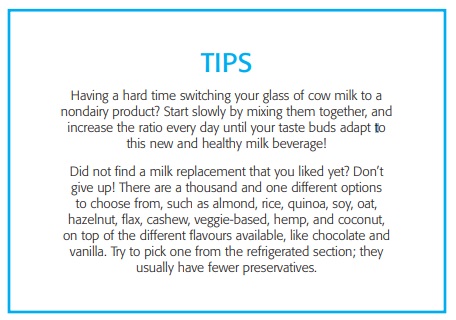Is Dairy Healthy?
Is Dairy Good For You? Now, This is a Hot Topic
It’s not surprising that it’s become so controversial. Between the American Food Pyramid
and the Canadian Food Guide touting its benefits (paid for by the dairy association, no
doubt), and science saying there’s no proof of its benefits, the conversation can get super
confusing.
 But here’s the thing: Human adults are
But here’s the thing: Human adults are
the only adults that consume milk.
So that begs the question: “Are the dairy recommendations supported by science
and in our best interest? Or are they
better for the wallets of the top dogs of
the dairy association?”
Let’s break it down a little…
Is Dairy Nutritious?
Dairy contains a good dose of proteins,
fats, and micronutrients—like calcium,
vitamin D, riboflavin (B2), vitamin B12,
potassium, and phosphorus.
This sounds good, but we must remember
that the nutrient composition in dairy is
dependent on many variable—the type of
product (milk v. butter v. cheese), how the
cow was raised and fed (antibiotics,
hormones, pesticides), and how the product
was processed and treated (raw v. pasteurized).
Also, contrary to popular belief, it is not great for bone health or sports nutrition, and it increases your risk of cancer—plus many people can’t even digest it!
So, is it nutritious? Possibly in its raw and unpasteurized form, in small amounts, and if
you can digest it. However, it’s not something I recommend to my patients.
Keep reading to get a better understanding…
But Isn’t It High in Calcium?
At some point, I’m praying this argument gets laid to rest. Yet, still, it’s the biggest question
I get asked.
Yes, dairy does contain a good amount of calcium. The problem is that dairy creates an
acidic environment in the body. When this happens, our body is forced to pull minerals
from our organs, tissues, and bones (calcium and magnesium) to balance out our pH
levels again.
In other words, dairy is more likely to lead to low bone density, fractures, and osteoporosis,
not the other way around.
Do I recommend it to my patients to increase their calcium intake? Nope! There are plenty
of foods and good supplements that can give them exactly what they need that keeps their
pH levels in check.
What About Lactose Intolerance?
About three quarters of the world’s population is lactose-intolerant, meaning they can’t
properly digest dairy products.
As infants, we have the digestive enzyme lactase, which helps to break down lactose (the
milk sugar) from mom’s milk. By the age of two through five, we stop producing much of
the lactase enzyme, making it harder to break it down.
When we continue to consume it, we’re more likely to develop a food sensitivity, intolerance,
or allergy.
Some symptoms related to an intolerance are:
- Bloating
- Gas
- Constipation
- Diarrhea
- Nausea
- Vomiting
- Moodiness
- Anxiety
- Brain fog
- Troubles sleeping
- Cravings
- Inflammation
- Low functioning immune system
- And more…
Some people who are lactose intolerant can still handle fermented dairy (like yogurt), so just
because you eat yogurt doesn’t mean you’re in the clear!
But Is It Healthy?
Though on paper its composition makes it look really good (kind of like a filtered photo on
Instagram!), the fact remains that it is hard for us to digest and many dairy products contain
hormones, pesticides, antibiotics, saturated fats, and sugars.
When it comes to infants who are graduating from breast milk or formula, opt to skip out on
giving them homogenized milk (you’re more likely to develop an allergy) and instead go for
a nutritious and balanced diet, with a healthy nut-milk when needed.
Instead of dairy, it’s better for you and the kids to get your nutrients (like calcium) through
whole foods—beans, nuts, seeds, vegetables, fruits, and whole grains.
Our bodies weren’t made to digest dairy, so why force a square peg into a round hole?

 Sharisse Dalby, Nutritionist (RNC)
Sharisse Dalby, Nutritionist (RNC)
Registered nutritional counselor, she helps families and children
beat their health struggles, focusing on digestive and emotional
issues.
www.sharissedalby.com

 Stores
Stores